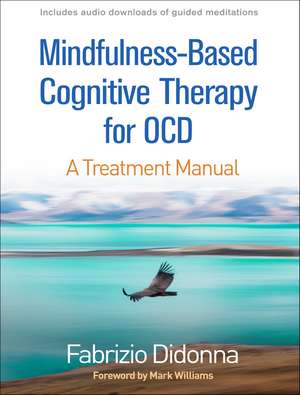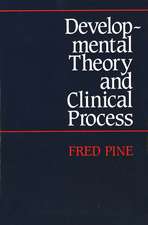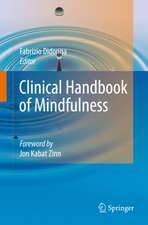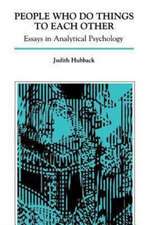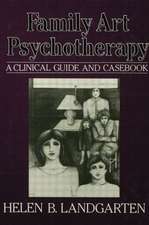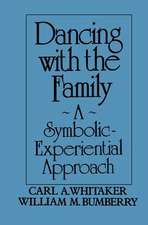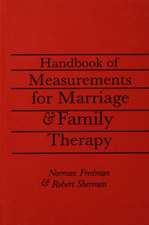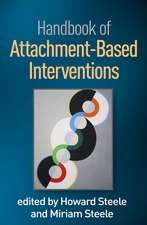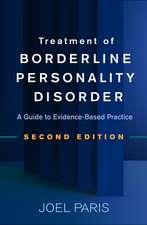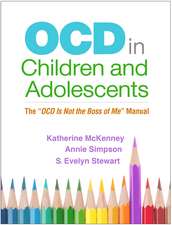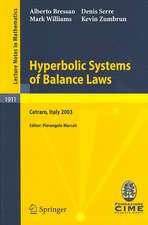Mindfulness-Based Cognitive Therapy for OCD: A Treatment Manual
Autor Fabrizio Didonnaen Limba Engleză Paperback – 18 dec 2019
This book presents the first treatment program that adapts the proven practices of mindfulness-based cognitive therapy (MBCT) to meet the unique needs of people struggling with obsessive–compulsive disorder (OCD). Leading authority Fabrizio Didonna shows how techniques such as "mindful exposure" are uniquely suited to help OCD sufferers overcome intrusive thoughts and compulsive rituals while developing a new relationship to their internal experience. In a convenient large-size format, the book includes detailed instructions for implementing each of the 11 group sessions, complete with reproducible scripts for the guided mindfulness practices and 79 client handouts. Purchasers can download and print the reproducible materials at the companion website, which also provides audio recordings of the guided practices. A separate website for clients features the audio files and scripts only.
Preț: 357.67 lei
Preț vechi: 376.50 lei
-5% Nou
Puncte Express: 537
Preț estimativ în valută:
68.45€ • 70.10$ • 56.94£
68.45€ • 70.10$ • 56.94£
Carte disponibilă
Livrare economică 25 februarie-11 martie
Livrare express 11-15 februarie pentru 48.09 lei
Preluare comenzi: 021 569.72.76
Specificații
ISBN-13: 9781462539277
ISBN-10: 1462539270
Pagini: 431
Dimensiuni: 203 x 267 x 27 mm
Greutate: 0.91 kg
Ediția:1
Editura: Guilford Publications
Colecția Guilford Press
ISBN-10: 1462539270
Pagini: 431
Dimensiuni: 203 x 267 x 27 mm
Greutate: 0.91 kg
Ediția:1
Editura: Guilford Publications
Colecția Guilford Press
Public țintă
Professional Practice & DevelopmentCuprins
Introduction
I. Theory and Conceptualization
1. What Is OCD?
2. A Mindfulness-Based Approach to OCD
3. The MBCT for OCD Program: Rationale, Structure, and Basic Principles
4. Preparing to Conduct MBCT for OCD and Participant Assessment
II. The MBCT for OCD Program
5. Session 1: Understanding What Mindfulness Is
6. Session 2: Understanding OCD and How Mindfulness Helps
7. Session 3: Helping Family Members and Partners Support Patients with OCD
8. Session 4: Understanding One’s Mistrust and Developing Real Trust
9. Session 5: Using the Senses to Develop Trust
10. Session 6: Developing a Healthy Relationship with Thoughts
11. Session 7: Developing Acceptance as a Core Step to Change
12. Session 8: Mindful Doing and Mindful Exposure
13. Session 9: Developing Self-Compassion and Self-Forgiveness
14. Session 10: Learning to Take Risks
15. Session 11: Facing Life with Trust and Dealing with Obstacles Effectively
Appendix. Training and Supervision in MBCT for OCD
Audio Downloads:
1. Introduction (3:57)
2. Body Scan: Mindfulness of the Body (Sessions 1 and 2) (20:59)
3. Mindfulness of the Breath (Session 1) (11:12)
4. Sitting Meditation: Mindfulness of the Breath and Body (Session 2) (18:21)
5. Breathing Space (Sessions 4–6) (6:18)
6. Sitting Meditation: Mindfulness of the Breath, Body, Sounds, Emotions, and Thoughts (Sessions 4 and 5) (10:19)
7. Mindful Walking (Session 4) (19:41)
8. Mindful Movements and Stretching (Sessions 5 and 11) (24:48)
9. Observing Mind Meditation (Sessions 6–11) (21:51)
10. R.E.A.L. Acceptance Practice (Session 7) (21:46)
11. Mindful Exposure (Sessions 8–11) (16:35)
12. Mindful Walking with Verbal Stabilizers (Session 8) (5:49)
13. Self-Compassion Practice (Sessions 9–11) (32:25)
14. Self-Forgiveness Practice (Sessions 9–11) (13:15)
15. Bus Driver Exercise (Session 11) (15:54)
I. Theory and Conceptualization
1. What Is OCD?
2. A Mindfulness-Based Approach to OCD
3. The MBCT for OCD Program: Rationale, Structure, and Basic Principles
4. Preparing to Conduct MBCT for OCD and Participant Assessment
II. The MBCT for OCD Program
5. Session 1: Understanding What Mindfulness Is
6. Session 2: Understanding OCD and How Mindfulness Helps
7. Session 3: Helping Family Members and Partners Support Patients with OCD
8. Session 4: Understanding One’s Mistrust and Developing Real Trust
9. Session 5: Using the Senses to Develop Trust
10. Session 6: Developing a Healthy Relationship with Thoughts
11. Session 7: Developing Acceptance as a Core Step to Change
12. Session 8: Mindful Doing and Mindful Exposure
13. Session 9: Developing Self-Compassion and Self-Forgiveness
14. Session 10: Learning to Take Risks
15. Session 11: Facing Life with Trust and Dealing with Obstacles Effectively
Appendix. Training and Supervision in MBCT for OCD
Audio Downloads:
1. Introduction (3:57)
2. Body Scan: Mindfulness of the Body (Sessions 1 and 2) (20:59)
3. Mindfulness of the Breath (Session 1) (11:12)
4. Sitting Meditation: Mindfulness of the Breath and Body (Session 2) (18:21)
5. Breathing Space (Sessions 4–6) (6:18)
6. Sitting Meditation: Mindfulness of the Breath, Body, Sounds, Emotions, and Thoughts (Sessions 4 and 5) (10:19)
7. Mindful Walking (Session 4) (19:41)
8. Mindful Movements and Stretching (Sessions 5 and 11) (24:48)
9. Observing Mind Meditation (Sessions 6–11) (21:51)
10. R.E.A.L. Acceptance Practice (Session 7) (21:46)
11. Mindful Exposure (Sessions 8–11) (16:35)
12. Mindful Walking with Verbal Stabilizers (Session 8) (5:49)
13. Self-Compassion Practice (Sessions 9–11) (32:25)
14. Self-Forgiveness Practice (Sessions 9–11) (13:15)
15. Bus Driver Exercise (Session 11) (15:54)
Notă biografică
Fabrizio Didonna, PsyD, is Professor in the Institute for Lifelong Learning of the University of Barcelona, Spain, and Visiting Professor at Shanghai Jiao Tong University in China. A clinical psychologist, he is a teacher and trainer at several postgraduate schools of cognitive-behavioral therapy in Italy. Dr. Didonna is founder and President of the Italian Institute for Mindfulness and Scientific Director of the Institute-sponsored Master's Program in Mindfulness-Based Therapy. He is Coordinator of the Unit for Obsessive–Compulsive Disorder (OCD) at the Villa Margherita private hospital in Vicenza, Italy, and Director of the MBCT for OCD Center in Vincenza. A long-time practitioner and teacher of meditation, he is an experienced instructor of mindfulness-based groups and has trained more than 2,000 participants in inpatient and outpatient settings. He was one of the first therapists to do mindfulness training with inpatients with severe disorders. Dr. Didonna has presented scientific papers, gives workshops and lectures internationally, and has published numerous articles, chapters, and books, including the Clinical Handbook of Mindfulness.
Recenzii
"This book combines rigorous psychological science, profound clinical wisdom, and a deep understanding of MBCT to provide a creative new perspective on OCD. It will be of great benefit both to those who suffer from this disorder and those who work with them to alleviate their suffering."--Ruth A. Baer, PhD, Department of Psychology, University of Kentucky
"This groundbreaking book promises to change how we understand and treat OCD. Written with a rare balance of clarity, detail, and depth, it offers a multifaceted program for treating what is so often an intractable disorder. Didonna’s penetrating clinical understanding, mastery of the research literature, and personal experience with mindfulness shine through on every page. The book is replete with practical techniques and vivid case illustrations. This is a 'must read' for any clinician, student, or researcher who wants to help those suffering with OCD or to understand more broadly how mindfulness practices can help alleviate psychological distress."--Ronald D. Siegel, PsyD, Center for Mindfulness and Compassion, Harvard Medical School/Cambridge Health Alliance
"Truly an outstanding contribution. A world leader in mindfulness-based clinical practice, Didonna draws on many years of experience to present his combined CBT and mindfulness approach. This book offers compassionate insight into the pain of OCD and its destructive effects on individuals and their families. It includes extraordinarily detailed and well-worked-out treatment plans. Presented is a session-by-session program that enables the therapist to gently and skillfully structure interventions. Illuminating case material includes client–therapist dialogues. This is a book I will return to again and again. It is a gift for any clinician working with these painful and frightening mental states, and is sure to become a classic."--Paul Gilbert, PhD, FBPsS, OBE, Centre for Compassion Research and Training, University of Derby, United Kingdom
"Didonna is a true pioneer in mindfulness and the treatment of anxiety and OCD. This book will revolutionize our approach to OCD. Didonna shows how to empower clients with the self-compassion and courage they need to face their fears. This book has my highest recommendation."--Dennis Tirch, PhD, Founding Director, The Center for Compassion Focused Therapy, New York City
"Didonna not only comes up with new insights about OCD itself, but in his 11-session program he develops MBCT in new directions.…If the science and practice of MBCT is to progress, it needs the careful combination of clinical wisdom and scientific rigor that this book represents. It is the first manual for the application of MBCT to OCD, and provides not only the foundation for further research but also the essential roadmap that clinicians will need for understanding and helping those many people who suffer in this way."--from the Foreword by Mark Williams, DPhil, Emeritus Professor of Clinical Psychology, University of Oxford, United Kingdom
-This excellent treatment manual uses a step-by-step approach, with specific instructions for each session. Practitioners have online access to reproducible scripts of the mindfulness exercises and 79 client handouts. Clients can review audio files and scripts at the website as well. This book provides clinicians with another therapeutic tool to help clients.--Doody's Review Service, 5/11/2020"This groundbreaking book promises to change how we understand and treat OCD. Written with a rare balance of clarity, detail, and depth, it offers a multifaceted program for treating what is so often an intractable disorder. Didonna’s penetrating clinical understanding, mastery of the research literature, and personal experience with mindfulness shine through on every page. The book is replete with practical techniques and vivid case illustrations. This is a 'must read' for any clinician, student, or researcher who wants to help those suffering with OCD or to understand more broadly how mindfulness practices can help alleviate psychological distress."--Ronald D. Siegel, PsyD, Center for Mindfulness and Compassion, Harvard Medical School/Cambridge Health Alliance
"Truly an outstanding contribution. A world leader in mindfulness-based clinical practice, Didonna draws on many years of experience to present his combined CBT and mindfulness approach. This book offers compassionate insight into the pain of OCD and its destructive effects on individuals and their families. It includes extraordinarily detailed and well-worked-out treatment plans. Presented is a session-by-session program that enables the therapist to gently and skillfully structure interventions. Illuminating case material includes client–therapist dialogues. This is a book I will return to again and again. It is a gift for any clinician working with these painful and frightening mental states, and is sure to become a classic."--Paul Gilbert, PhD, FBPsS, OBE, Centre for Compassion Research and Training, University of Derby, United Kingdom
"Didonna is a true pioneer in mindfulness and the treatment of anxiety and OCD. This book will revolutionize our approach to OCD. Didonna shows how to empower clients with the self-compassion and courage they need to face their fears. This book has my highest recommendation."--Dennis Tirch, PhD, Founding Director, The Center for Compassion Focused Therapy, New York City
"Didonna not only comes up with new insights about OCD itself, but in his 11-session program he develops MBCT in new directions.…If the science and practice of MBCT is to progress, it needs the careful combination of clinical wisdom and scientific rigor that this book represents. It is the first manual for the application of MBCT to OCD, and provides not only the foundation for further research but also the essential roadmap that clinicians will need for understanding and helping those many people who suffer in this way."--from the Foreword by Mark Williams, DPhil, Emeritus Professor of Clinical Psychology, University of Oxford, United Kingdom
Descriere
This book presents the first treatment program that adapts the proven practices of mindfulness-based cognitive therapy (MBCT) to meet the unique needs of people struggling with obsessive–compulsive disorder (OCD).
